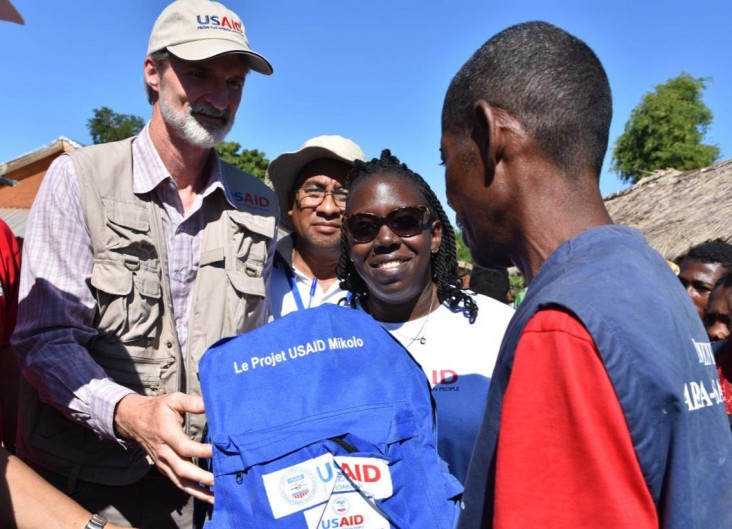Press Release Shim
Speeches Shim

Millions of children in Madagascar are on track for a healthier life thanks to the achievements of Mikolo, a community health project from USAID Madagascar which is completing its five-year lifespan
For Immediate Release
TOLIARA, MADAGASCAR - Stronger networks of community health services, improved quality of care, and significant gains in maternal and child health are just part of the legacy of the five-year Mikolo project from USAID Madagascar, which concluded its work during a ceremony held in Toliara. The USAID Mikolo end-of-project ceremony was attended by the many partners who made the project’s success possible, including the Ministry of Public Health (MOPH), USAID Madagascar staff, and other financial and technical contributors.
Since 2013 USAID Mikolo has worked alongside the Government of Madagascar to strengthen the capacity of the national health system by delivering high-quality community-based health services to communities more than five kilometers from a health center.
Overall, the gains made by the USAID Mikolo project over the past five years have helped to build a stronger and more sustainable national health system that is responsive to the needs of Madagascar’s population.
“USAID transforms the health and futures of Malagasy people through our projects like Mikolo,” said Chris Milligan, USAID Madagascar’s Acting Mission Director. “We’ve accomplished a lot in five years, but there’s still so much more to do. USAID will continue to be a key partner in strengthening Madagascar’s health system.”
Minister of Public Health Mamy Lalatiana Andriamanarivo also commented on the USAID Mikolo project, saying, “We would like development partners to do what USAID Mikolo has done: they’ve left a legacy to the Malagasy health system. They’ve left sustainable impacts with innovative approaches, in collaboration with the MOPH, at all levels of our health system.”
Over the life of the project, USAID Mikolo achieved significant improvements in maternal and child health for Madagascar that include:
- Continuing users of family planning increased from 66,465 in 2014 to 150,557 in 2018
- 130,250 children under five treated for diarrhea with oral rehydration therapy, with the treatments provided by Community Health Volunteers (CHVs) trained by USAID Mikolo
- 302,158 children under five suffering from pneumonia provided with appropriate care
- Treatment rate with artemisinin-based combination therapy (ACT) for confirmed malaria cases in children under five increased from 58% in 2014 to 93% in 2018
- ACT supplies more readily available, with stock-outs decreased from 20% in 2014 to 5% in 2018
- 2,987,746 children registered for growth monitoring and promotion activities from 2014 to 2018
- 118,664 women referred by CHVs for antenatal care over the last five years
- The annual number of women giving birth in qualified health facilities increased from 50,192 in 2015 to 115,148 in 2017
“We’ve appreciated the leadership role that the Ministry of Public Health has played in terms of community health during these five years,” said John Yanulis, USAID Mikolo Project Director. “The national health system has shown great resilience, and is responding with a renewed and strengthened variety of health services - especially for isolated rural populations, where community health volunteers are doing incredible work and are dedicated to working in their communities to save lives.”
In partnership with the Ministry of Public Health, USAID Mikolo has introduced and scaled up innovative interventions, tools, and approaches including:
- a mobile health application that improves the quality of CHV service delivery and reporting;
- a CHV peer supervision program to improve quality of care, reduce the human resources gap, and improve CHV motivation;
- a community-based commodity logistics management system;
- an epidemiological surveillance approach incorporating community-level data to more rapidly respond to malaria outbreaks;
- and the introduction of Savings and Internal Lending Communities to increase access to credit and economic empowerment of community members;
“Through close collaboration and coordination with the Ministry of Public Health, this project was able to effectively and efficiently transfer ownership of its activities, programs, tools, and materials over to the Government of Madagascar and its partners,” said Director Yanulis. “The community health platform has been strengthened to the point that it is now an essential pillar of the public health system offering front line care to the most vulnerable Malagasy populations and ensuring that the Ministry of Public Health is attending to the needs of people in remote communities.”
The USAID Mikolo project was implemented by Management Sciences for Health (MSH), in coordination with partners Action Socio-sanitaire Organisation Secours, Catholic Relief Services, Institut Technologique de l’Education et du Management, Dimagi, and Overseas Strategic Consulting, Ltd.

Comment
Make a general inquiry or suggest an improvement.